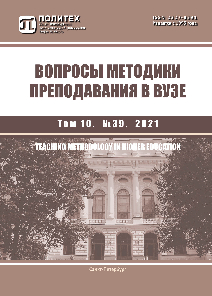Developing Learning and Cognitive Competence through Studying Terminological Vocabulary in Literary Texts
The article concentrates on the study of developing learning and cognitive competence in students of language specialties in the process of analyzing terminological vocabulary in literary texts. The process of integrating fiction into language teaching, which is currently given scant attention, is considered as an opportunity to create a learning environment characterized by an active and central position of students in class, which allows to overcome professional isolation and cultural limitations of students, and contributes to the formation of international level specialists. The article explores the multidimensionality of the term as a linguistic phenomenon. An attempt is made to study the information aspect of the term, its use as an artistic device. The examples of work with the excerpts from fiction texts show the possibility to develop learning and cognitive skills and abilities in the process of terminology analysis. The article also discusses the main specialized programs functioning within the framework of computer terminology – KARTOTEKA, Compleat Lexical Tutor, COCA. Using these programs contributes to forming of some competencies, learning and cognitive in particular. Data from the website Compleat Lexical Tutor demonstrate the use frequency of terms in fiction confirming the terminological potential of such texts. The relevance of the study consists in the need for further research of the literary text potential and its role in teaching foreign language terms and forming learning and cognitive competence in students of linguistic specialties. Cognitive activity on terminology analysis allows students to see the underlying content of a literary work, as well as to understand and decode the author's intention. In the course of work, the following methods were used: the method of summarizing and analyzing theoretical literature on the subject; semantic analysis method for determining the values of the factual material; contextual; interpretative analysis method.



